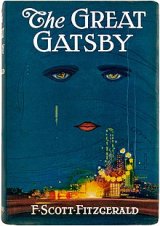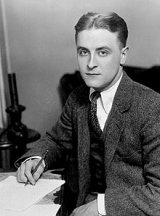The Great Gatsby Page #32
The Great Gatsby is a 1925 novel by American writer F. Scott Fitzgerald. Set in the Jazz Age on Long Island, near New York City, the novel depicts first-person narrator Nick Carraway's interactions with mysterious millionaire Jay Gatsby and Gatsby's obsession to reunite with his former lover, Daisy Buchanan. The novel was inspired by a youthful romance Fitzgerald had with socialite Ginevra King, and the riotous parties he attended on Long Island's North Shore in 1922
splash upon the keys of a ghostly piano. There was an inexplicable amount of dust everywhere, and the rooms were musty, as though they hadn’t been aired for many days. I found the humidor on an unfamiliar table, with two stale, dry cigarettes inside. Throwing open the French windows of the drawing-room, we sat smoking out into the darkness. “You ought to go away,” I said. “It’s pretty certain they’ll trace your car.” “Go away now, old sport?” “Go to Atlantic City for a week, or up to Montreal.” He wouldn’t consider it. He couldn’t possibly leave Daisy until he knew what she was going to do. He was clutching at some last hope and I couldn’t bear to shake him free. It was this night that he told me the strange story of his youth with Dan Cody—told it to me because “Jay Gatsby” had broken up like glass against Tom’s hard malice, and the long secret extravaganza was played out. I think that he would have acknowledged anything now, without reserve, but he wanted to talk about Daisy. She was the first “nice” girl he had ever known. In various unrevealed capacities he had come in contact with such people, but always with indiscernible barbed wire between. He found her excitingly desirable. He went to her house, at first with other officers from Camp Taylor, then alone. It amazed him—he had never been in such a beautiful house before. But what gave it an air of breathless intensity, was that Daisy lived there—it was as casual a thing to her as his tent out at camp was to him. There was a ripe mystery about it, a hint of bedrooms upstairs more beautiful and cool than other bedrooms, of gay and radiant activities taking place through its corridors, and of romances that were not musty and laid away already in lavender but fresh and breathing and redolent of this year’s shining motorcars and of dances whose flowers were scarcely withered. It excited him, too, that many men had already loved Daisy—it increased her value in his eyes. He felt their presence all about the house, pervading the air with the shades and echoes of still vibrant emotions. But he knew that he was in Daisy’s house by a colossal accident. However glorious might be his future as Jay Gatsby, he was at present a penniless young man without a past, and at any moment the invisible cloak of his uniform might slip from his shoulders. So he made the most of his time. He took what he could get, ravenously and unscrupulously—eventually he took Daisy one still October night, took her because he had no real right to touch her hand. He might have despised himself, for he had certainly taken her under false pretences. I don’t mean that he had traded on his phantom millions, but he had deliberately given Daisy a sense of security; he let her believe that he was a person from much the same strata as herself—that he was fully able to take care of her. As a matter of fact, he had no such facilities—he had no comfortable family standing behind him, and he was liable at the whim of an impersonal government to be blown anywhere about the world. But he didn’t despise himself and it didn’t turn out as he had imagined. He had intended, probably, to take what he could and go—but now he found that he had committed himself to the following of a grail. He knew that Daisy was extraordinary, but he didn’t realize just how extraordinary a “nice” girl could be. She vanished into her rich house, into her rich, full life, leaving Gatsby—nothing. He felt married to her, that was all. When they met again, two days later, it was Gatsby who was breathless, who was, somehow, betrayed. Her porch was bright with the bought luxury of star-shine; the wicker of the settee squeaked fashionably as she turned toward him and he kissed her curious and lovely mouth. She had caught a cold, and it made her voice huskier and more charming than ever, and Gatsby was overwhelmingly aware of the youth and mystery that wealth imprisons and preserves, of the freshness of many clothes, and of Daisy, gleaming like silver, safe and proud above the hot struggles of the poor. ------------------------------------------------------------------------ “I can’t describe to you how surprised I was to find out I loved her, old sport. I even hoped for a while that she’d throw me over, but she didn’t, because she was in love with me too. She thought I knew a lot because I knew different things from her … Well, there I was, way off my ambitions, getting deeper in love every minute, and all of a sudden I didn’t care. What was the use of doing great things if I could have a better time telling her what I was going to do?” On the last afternoon before he went abroad, he sat with Daisy in his arms for a long, silent time. It was a cold fall day, with fire in the room and her cheeks flushed. Now and then she moved and he changed his arm a little, and once he kissed her dark shining hair. The afternoon had made them tranquil for a while, as if to give them a deep memory for the long parting the next day promised. They had never been closer in their month of love, nor communicated more profoundly one with another, than when she brushed silent lips against his coat’s shoulder or when he touched the end of her fingers, gently, as though she were asleep. ------------------------------------------------------------------------ He did extraordinarily well in the war. He was a captain before he went to the front, and following the Argonne battles he got his majority and the command of the divisional machine-guns. After the armistice he tried frantically to get home, but some complication or misunderstanding sent him to Oxford instead. He was worried now—there was a quality of nervous despair in Daisy’s letters. She didn’t see why he couldn’t come. She was feeling the pressure of the world outside, and she wanted to see him and feel his presence beside her and be reassured that she was doing the right thing after all. For Daisy was young and her artificial world was redolent of orchids and pleasant, cheerful snobbery and orchestras which set the rhythm of the year, summing up the sadness and suggestiveness of life in new tunes. All night the saxophones wailed the hopeless comment of the “Beale Street Blues” while a hundred pairs of golden and silver slippers shuffled the shining dust. At the grey tea hour there were always rooms that throbbed incessantly with this low, sweet fever, while fresh faces drifted here and there like rose petals blown by the sad horns around the floor. Through this twilight universe Daisy began to move again with the season; suddenly she was again keeping half a dozen dates a day with half a dozen men, and drowsing asleep at dawn with the beads and chiffon of an evening-dress tangled among dying orchids on the floor beside her bed. And all the time something within her was crying for a decision. She wanted her life shaped now, immediately—and the decision must be made by some force—of love, of money, of unquestionable
Translation
Translate and read this book in other languages:
Select another language:
- - Select -
- 简体中文 (Chinese - Simplified)
- 繁體中文 (Chinese - Traditional)
- Español (Spanish)
- Esperanto (Esperanto)
- 日本語 (Japanese)
- Português (Portuguese)
- Deutsch (German)
- العربية (Arabic)
- Français (French)
- Русский (Russian)
- ಕನ್ನಡ (Kannada)
- 한국어 (Korean)
- עברית (Hebrew)
- Gaeilge (Irish)
- Українська (Ukrainian)
- اردو (Urdu)
- Magyar (Hungarian)
- मानक हिन्दी (Hindi)
- Indonesia (Indonesian)
- Italiano (Italian)
- தமிழ் (Tamil)
- Türkçe (Turkish)
- తెలుగు (Telugu)
- ภาษาไทย (Thai)
- Tiếng Việt (Vietnamese)
- Čeština (Czech)
- Polski (Polish)
- Bahasa Indonesia (Indonesian)
- Românește (Romanian)
- Nederlands (Dutch)
- Ελληνικά (Greek)
- Latinum (Latin)
- Svenska (Swedish)
- Dansk (Danish)
- Suomi (Finnish)
- فارسی (Persian)
- ייִדיש (Yiddish)
- հայերեն (Armenian)
- Norsk (Norwegian)
- English (English)
Citation
Use the citation below to add this book to your bibliography:
Style:MLAChicagoAPA
"The Great Gatsby Books." Literature.com. STANDS4 LLC, 2025. Web. 27 Feb. 2025. <https://www.literature.com/book/the_great_gatsby_1598>.








Discuss this The Great Gatsby book with the community:
Report Comment
We're doing our best to make sure our content is useful, accurate and safe.
If by any chance you spot an inappropriate comment while navigating through our website please use this form to let us know, and we'll take care of it shortly.
Attachment
You need to be logged in to favorite.
Log In